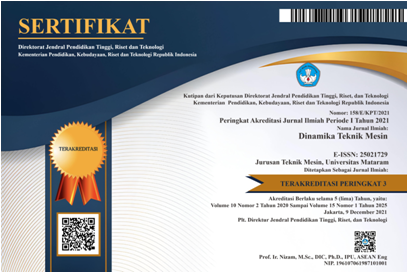Aplikasi medan magnet pada saluran bahan bakar sepeda motor untuk penghematan konsumsi bahan bakar dan penurunan emisi gas buang
Abstract
Reducing fuel consumption and improving fuel quality in motorcycle engines are very important in order to make the exhaust gas emission from the engine becomes more environmentally friendly. In this study, a magnetic field is attached to the fuel line so that the fuel is affected by the magnetic field. The magnetic field is obtained from electromagnetic magnets and permanent magnets. Fuel consumption is tested on a motorcycle engine that it uses a carburetor system and on an engine that uses a fuel injection system. The exhaust emissions observed were CO and HC by using exhaust gas analyzer. The results showed that the use of a magnetic field mounted on the fuel line can reduce the fuel consumption of a motorcycle engine, using either a carburetor system or a fuel injection system by an average of 18%. The use of magnetic fields also shows a very good effect in reducing exhaust gas emissions from motorcycle engines. The length of the magnet attached to the fuel line, 80mm provides a reduction in exhaust gas emissions of CO by 80% - 90% and HC by 60% - 77%. The percentage reduction in exhause gas emission is better than the other length of magnets.
Keywords
Full Text:
PDFReferences
Chavan, S., & Jhavar, P. (2016). Effects of application of magnetic field on efficiency of petrol engine.pdf. International Research Journal of Engineering and Technology, 03(09), 152–161.
Chen, C. Y., Lee, W. J., Mwangi, J. K., Wang, L. C., & Lu, J. H. (2017). Impact of magnetic tube on pollutant emissions from the diesel engine. Aerosol and Air Quality Research, 17(4), 1097–1104. https://doi.org/10.4209/aaqr.2016.11.0478
Fatih, El, F. A., and Saber, G. M. (2010). Effect of fuel magnetism on engine performance and emissions. Australian Journal of Basic and Applied Sciences, 4(12), 6354–6358.
Faris, A. S., Al-Naseri, S. K., Jamal, N., Isse, R., Abed, M., Fouad, Z., Kazim, A., Reheem, N., Chaloob, A., Mohammad, H., Jasim, H., Sadeq, J., Salim, A., & Abas, A. (2012). Effects of magnetic field on fuel consumption and exhaust emissions in two-stroke engine. Energy Procedia, 18, 327–338. https://doi.org/10.1016/j.egypro.2012.05.044
Fuhaid, N., Sahbana, M. A., & Arianto, A. (2011). Pengaruh Medan Elektromagnet Terhadap Konsumsi Bahan Bakar Dan Emisi Gas Buang Pada Motor Bensin. Proton, 3(1), 1–9.
Guerrero Torres, R., and Mehrvar, M. (2018). An Experimental Evidence of Gasoline Ionization by a Magnetic Field. Proceedings of the 2nd International Conference of Recent Trends in Environmental Science and Engineering (RTESE’18), 144, 1–8. https://doi.org/10.11159/rtese18.144
Kumar, P. V., Patro, S. K., dan Pudi, V. (2014). Experimental study of a novel magnetic fuel ionization method in four stroke diesel engines. Int. J. Mech Eng. And Rob. Res., 3(1), 151–159.
Mane, D. R., dan Sawant, V. S. (2015). A comparative study of effect of magnetic field on exhaust emission in internal combustion engine. IOSR Journal of Applied Physics, 7(6), 38–40. https://doi.org/10.9790/4861-07623840
Mara, I.M., Alit, I. B., & Nuarsa, I. M. (2021). Penurunan konsumsi bahan bakar pada mesin bensin 4 langkah 1 silinder dengan menggunakan medan magnet elektomagnetik. Dinamika Teknik Mesin, 11(1), 49. https://doi.org/10.29303/dtm.v11i1.374
Mara, I Made, Joniarta, I. W., Alit, I. B., Sayoga, I. M. A., & Nuarsa, M. (2018). Analisis penggunaan alat magnetisasi bahan bakar secara elektromagnetik terhadap unjuk kerja mesin empat langkah satu silinder. Dinamika Teknik Mesin, 8(2), 98–103. https://doi.org/10.29303/dtm.v8i2.233
Sathiamurthi, P., Karthi Vinith, K. S., & Sivakumar, A. (2019). Performance and emission test in CI engine using magnetic fuel conditioning with nano additives. International Journal of Recent Technology and Engineering, 8(3), 7823–7826. https://doi.org/10.35940/ijrte.C6213.098319
Tamol, R. A., Sr., & VA. (2005). Method and Apparatus To Increase Combustion Efficiency and To Reduce Exhaust Gas Pollutants From Combustion of a Fuel. 1(12), vol 1, nos. 12, 2005.
Ugare, V., Dhoble, S., Lutade, S., & Mudafale, K. (2014). Performance of internal combustion (CI) engine under the influence of stong permanent magnetic field. Journal of Mechanical and Civil Engineering, 2014(Ci), 11–17.
DOI: https://doi.org/10.29303/dtm.v12i1.500
Refbacks
- There are currently no refbacks.
Copyright (c) 2022 I Made Mara, Ida Bagus Alit, I Gede Bawa Susana, I Made Nuarsa

This work is licensed under a Creative Commons Attribution-NonCommercial 4.0 International License.






















